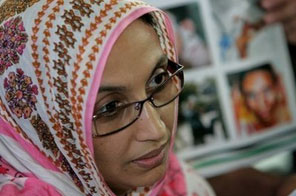Morocco hits out at Aminatou Haidar
RABAT: Morocco on Wednesday warned a rights activist on hunger strike for more than two weeks after being denied entry into her native Western Sahara she must face the consequences of her actions.
Foreign Minister Taieb Fassi Fihri said award-winning activist Aminatou Haidar had "disowned her identity and her nationality" and accused her of provoking the authorities.
"She must accept, on her own, the legal and moral consequences which result from this behaviour," the minister told the Moroccan parliament.
He said she "deliberately, and without any pressure, gave up her passport and national identity card."
"These two documents are the expression of Moroccan sovereignty and it is not permitted to damage their symbolism," Fassi Fihri added.
Haidar has refused to eat since November 16, three days after Moroccan authorities denied her entry into Western Sahara, a disputed territory annexed by Morocco in 1975.
Her health has deteriorated since the hunger strike began.
The mother-of-two previously told AFP Moroccan authorities denied her entry to the Western Sahara because of her refusal to accept the territory is part of Morocco.
At the weekend, she refused an offer from Spain's foreign minister of Spanish nationality, as well as an offer to grant political refugee status to her and her family, according to her lawyer.
Her lawyer Ines Miranda said the offer would have made her "a foreigner in her own home."
Haidar, winner of the Robert Kennedy human rights prize in 2008, also accused Spain of siding with Morocco in an interview Saturday published in the El Pais newspaper.
Moroccan authorities arrested Haidar on November 13 on her arrival in Western Sahara's main city of Laayoune from Spain's Canary Islands.
Immigration officials immediately sent her back to the archipelago after allegedly confiscating her passport. She used her Spanish residency permit to re-enter the country.
Morocco annexed phosphate-rich Western Sahara after Spain left in 1975 and has pledged to grant it widespread autonomy, but rules out independence as demanded by the Polisario Front movement.
While fighting in the desert territory halted in 1991, UN-sponsored talks on Western Sahara's future have made no headway.






